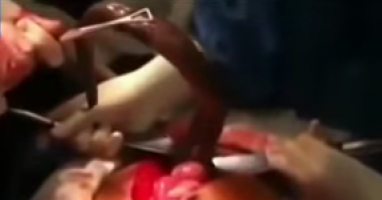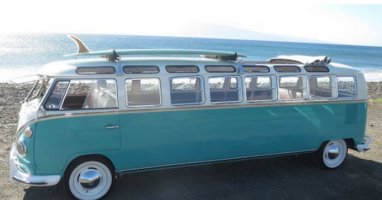Drinking in Russia
When in Russia, drink vodka. But not vodka with a mixer, or even vodka with ice (as the water in Russia isn't safe), just straight up, throat-burning, rubbing-alcohol-tasting, vodka. And plan to do it often because the whole joke about Russians loving their vodka isn't a lie. In fact, the average Russian is said to consume approximately one pint of vodka per day; or one-half of a half liter. Does that make anyone else's liver hurt? Sadly, it musn't come as much of a surprise that the average life expectancy of the Russian male is 58 years old.
If ever you are invited to a traditional Russian dinner, expect a shot of vodka frequently throughout the meal. It is custom for Russians to toast in the presence of guests and refusing a shot is considered very bad form and will deeply insult your host. Like the French with their wine, vodka is said to enhance the flavors of Russian cooking. Getting bombed will be difficult/impossible to avoid, so just go along with it and have fun.
Drinking in Barcelona
One drinking etiquette rule in Barcelona is: never ask for "la ultima", which translates to "the last drink". It's considered bad luck as it sounds like your last drink on earth. Instead- order "la penultima", your next but last, even though we all know that may lead to more "penultimas".
Drinking in France
In France, an aperitif is drunk before the meal, and a digestif after. During the meal, it is typical for various wines to be tasted throughout in order to accompany the food. Make sure you don't chew gum, smoke cigars or put anything too strong tasting in your mouth as it is said to infringe on your tastebuds.
Drinking in China
The very fact that the Chinese word for "cheers" is "gan-bei", which translates to "to dry the glass" is quite telling of Chinese drinking customs. As a guest in a Chinese home, don't be alarmed if the host seems incredibly adamant on urging you to drink more and more and more. The more a guest drinks, the happier the host feels. Willingness to drink also demonstrates your feelings of warmth and friendship. Getting drunk together is said to "purify and raise love to a higher level". Now isn't that a wonderful way to feel about alcohol? With such a deep and spiritual appreciation for getting tanked, you will be exceedingly disgracing your host if you refuse to drink.
It is a polite and ancient Chinese tradition to tap the table when being poured a drink, whether you are in a bar or a guest in someone's home. It is a way of thanking the person. Also, whereas in Western cultures it is polite to look at a person in the eyes when you're toasting, in China this is never done.
Drinking in Scotland
In Scotland, it is customary to indulge in chasers of Scotch whiskey, alongside a half pint of beer. A shot of whiskey is referred to as a 'wee dram' or a 'nip'.

Drinking in Japan
Drinking in Japan is strongly oriented towards Japanese businessmen. The Japanese culture is very formal and reserved with distinct hierarchal roles. Only when drinking are businessmen expected to let down their guards and get downright loaded. If you find yourself in a group setting, do not begin to drink until everyone is served. To "cheers" raise your glass and shout "Kampai!"
For any business functions, it is tradition and pretty well obligation to have a drinking party. The only reason you would be exempt from this would be if you had some sort of physical condition or illness.
Because the Japanese are very formal in their relationships with each other, drinking is the time to let their true personalities come out. The way they see it, it is impossible to really get to know someone unless you've drank with them. Those who stay sober are holding back their true character.
Japanese businessmen in lower and middle management are known to drink regularly, heavily and to have an incredible capacity to do this on a night-to-night basis, all the while managing to get up and go to work everyday.
Drinking in Great Britain
Going to pubs in Great Britain is a central part of British culture. There are 61,000 pubs in Britain and over ¾ of the adult population are regular pub-goers, visiting at least once a week. Needless to say if you find yourself in Britain, go to a pub, but know these next few etiquette tips first.
1) There is no waiter service. You go directly to the bar to order, pay and then you bring the drinks back to the table
2) It is customary to buy rounds. You get the first round for everyone, then the next person gets the next round, and so and so on, until the whole gang is pissed
3) Asking for a "beer" in a British pub is like asking for a "glass of wine" in French restaurant. They have about 20 different kinds of beer on tap, so at least know whether you want lager, bitter, bottle, pint or half pint. Be prepared to be made fun of if you're male and ordering a half pint
4) Tipping is not customary. If you want to show your gratitude to the bartender, buy them a drink. The bar is a place where everyone is equal. Tipping the bartender would be a reminder of their service role and considered quite insulting.
(To learn more about British drinking etiquette visit this great site: http://www.sirc.org/publik/pub.html)
Drinking in Ireland
Like pubs in Britain, pubs in Ireland are fundamental to Irish social culture. The custom, again, is to take turns buying rounds. Refusing a drink is only permitted if you have serious health issues or religious reasons. Beer in Ireland is typically served at room temperature, although Guinness, considered the "national drink" of Ireland, is always served cold. If you want whiskey, order Irish whiskey- and order it "neat", so as not to dilute the taste.







